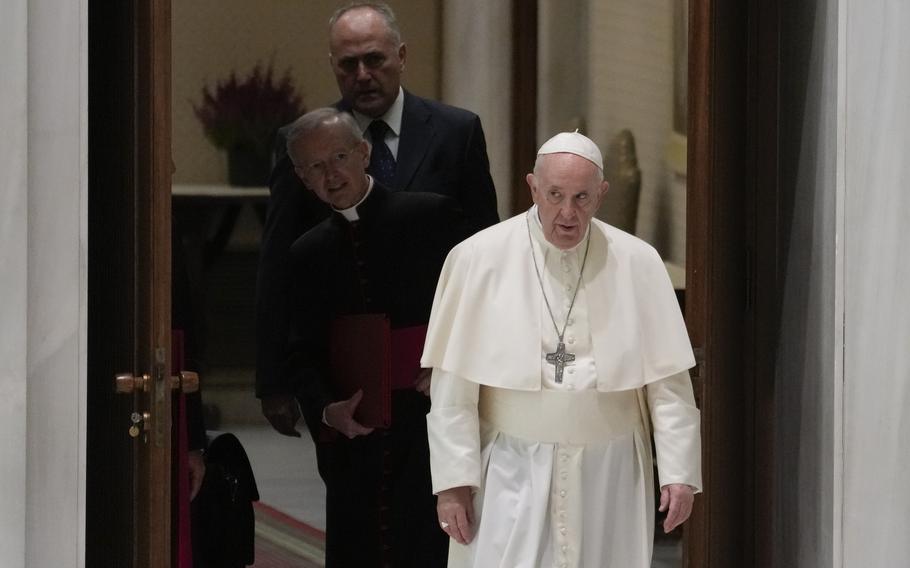
Pope Francis arrives for an audience with Lutheran pilgrims, in the Pope Paul VI hall at the Vatican, Monday, Oct. 25, 2021. (AP Photo/Andrew Medichini) (Andrew Medichini)
TORONTO - Pope Francis has agreed to visit Canada “on a pilgrimage of healing and reconciliation” with Indigenous people, the Canadian Conference of Catholic Bishops said Wednesday.
The visit, for which a date has not yet been determined, follows the discovery this year of evidence of hundreds of unmarked graves on or near the sites of former residential schools for Indigenous children in several provinces.
Those findings have breathed new life into long-standing calls from Indigenous leaders, Canadian lawmakers and residential school survivors for the pope to apologize for the Catholic Church’s role in the residential school system.
Under that system, which operated for more than a century, some 150,000 Indigenous children were separated from their families - often by force - and sent to the government-funded, mostly church-run schools to assimilate them. Physical, psychological and sexual abuse was rife.
It’s unclear whether an apology will be on the agenda for the papal visit.
“The Canadian Conference of Catholic Bishops has invited the Holy Father to make an apostolic journey to Canada, also in the context of the long-standing pastoral process of reconciliation with indigenous peoples,” the Vatican said in a statement. “His Holiness has indicated his willingness to visit the country on a date to be settled in due course.”
The Most. Rev. Raymond Poisson, bishop of Mont-Laurier, Quebec, and president of the Canadian Conference of Catholic Bishops, said he prayed that Francis’s visit “will be a significant milestone in the journey toward reconciliation and healing.”
The first residential schools in Canada began operating in the 19th century; the last one closed in the 1990s. They were mostly run by Catholic orders or entities. Children at the schools were punished for speaking their native languages and practicing their traditions, setting off cycles of multigenerational trauma.
In a landmark 2015 report, Canada’s Truth and Reconciliation Commission identified some 3,200 children who died at the schools. The figure has since grown.
Children died of disease, malnourishment, in accidents, in fires, by suicide or while trying to escape. Often their bodies weren’t sent back to their families, and they were buried in unmarked graves.
Some families never learned what happened to their children.
The commission concluded that the schools institutionalized child neglect and their operation constituted “cultural genocide.” Among 94 calls to action, the commission included an apology delivered on Canadian soil by the pope.
The Anglican, Presbyterian and United churches of Canada, which ran many of the rest of the schools, apologized for their roles in the system in the 1990s. Prime Minister Justin Trudeau’s predecessor, Stephen Harper, issued a formal apology on behalf of the Canadian government in 2008.
Several Canadian Catholic entities that ran the schools and some local church leaders have apologized, but the pope has not. The Church is also under pressure to release documents that might help identify children who died at the schools and where they are buried.
Trudeau, a Catholic, asked Francis to consider an apology during a May 2017 visit to the Vatican. He said he expected the Church “to practice quite literally what it preaches,” and that Francis’s unwillingness to apologize left him “disappointed.”
“We have seen, unfortunately, from the Catholic Church, a resistance to taking on responsibility, either financial or moral, for its role in residential schools,” Trudeau told reporters last week.
Trudeau himself has faced criticism for not acting swiftly enough to implement the commission’s calls to action and for failing to disclose documents in the government’s possession.
Francis has apologized for the “grave sins” of colonialism in Bolivia and the church’s “failings” during the Rwandan genocide. But in 2018, the Canadian Conference of Catholic Bishops said the pope “felt he could not personally respond” to the calls for a formal apology for the residential schools.
Bishops here have defended the pope by arguing that the papacy has shown sufficient remorse on the subject. They cite a meeting in 2009 with Indigenous leaders and residential school survivors in which Pope Benedict XVI said he felt “sorrow” about the schools.
Francis, too, said he felt “sorrow” after evidence of several hundred unmarked graves was discovered this year.
But Indigenous leaders and residential school survivors, who are scheduled to meet with the pope during a visit to Vatican City in December, have called for a formal papal apology similar to the one issued by Benedict in 2010 to those sexually abused by clergymen in Ireland.
Benedict wrote a letter to Irish Catholics in which he said he was “truly sorry” for the “sinful and criminal” acts that happened in Ireland and the “sense of betrayal” that many have experienced. The letter was widely criticized in Ireland because it did not mention the Vatican’s culpability.
“I think that for the Holy Father, in whom many of the faithful saw a lot of hope . . . full and complete recognition of the harm caused to Indigenous peoples was at the top of the list of what they wanted to see him do in Canada,” Marc Miller, Canada’s minister of Crown-Indigenous relations, told reporters Wednesday.